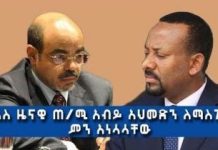The 11th Hargeisa International Book Fair (HIBF) kicked off this week with all its usual constitutive activities of inspirational lectures, book reviews, intellectual debates and celebrations of the young achievers. It is a yearly occasion that engulfs the country and mainly, the capital with excitement and jubilation. HIBF is an experience that attests to the enormity of the achievement we can accomplish if we put our hearts and minds together, it is indeed, an exceptional opportunity for learning, guidance and self-fulfilment.
Any social change starts with changing how people think and perceive their common interest. That is primarily shaped by the kind of educational information they get during the early years of mental development, and how this information is cemented by tools of public orientation, such as all types of literature, cinema, religion and media. Reading is the most fundamental element in all those various means of public education. Nothing more emphatic than the first verse of the Holy Qur’an revealed to the Prophet (PBUH); “(Read, in the name of your Lord who created” Al-Alaq: 1).
Reading widens the scope of one’s thinking and understanding; it induces the reader to question the long-standing beliefs and explore new possibilities and ways of doing things. So that, encouraging and nurturing the habit of reading by HIBF is a bold invitation for change, open-mindedness and tolerance.
HIBF creates a suitable medium where the talented and highly energetic writers and artists communicate and rub shoulders with the more seasoned, sagacious and celebrated poets and scholars of our society and from the world. Over ten days, they introduce themselves to a keen populace, exhibit their artistic innovations and create new bonds and friendships with their peers, as well as with seniors and foreign participants.
Hence, they earn confidence in their abilities to innovate and endure an evaluator critique for their works with an additional benefit of forging a close kinship with their mentors, consequently, shrinking the gap between these two generations and creating a shared sense of commonality.
HIBF serves another vital purpose for visiting academics and local intellectuals by giving them a platform to share their thoughts about the many challenges facing our nation and the region, and point out what they regard as the most crucial and pressing difficulties that need collective attention.

Although local politics and its squabbles continuously dominate public discourse, this event serves as a positive diversion and a break from that constant wrangling. HIBF is an annual opportunity for us to take a vacation from this headache and stretch our imagination and probably -stimulate our brains- to make a case for the many versions of the current social realities.
A wide range of topics get the attention they need; issues like the role of women and disabled in domestic politics, street children, disastrous and extensive consumption of Qat, and the destabilising effects of tribalism are discussed and dissected on different aspects.
It is evident that the crowd has grown bigger for this annual event, each year it attracts more participants, whether local or international and they have been steadily increasing both in number and rank, thus warranting the Book Fair an impressive reputation of vibrant dynamism and an attitude of inclusiveness.
Organisers of HIBF claim that their project represents a window of hope and optimism for this isolated and internationally ignored country. They firmly assert that Somaliland can benefit from this event in several ways. For instance, it can be utilised to attract international attention and support from a growing number of genuine sympathisers who can be enticed to deliver Somaliland’s case for independence to the influential international institutions.
Furthermore, it imparts a clear message to the world about Somaliland: its history, uniqueness and tremendous successes. If skilfully organised and cleverly exploited, this intellectuals’ gathering can be an excellent opportunity for Somaliland, regarding publicity as well as diplomacy building.
For the relevance of this event to continue, its core message should be kept pertinent to the concerns of our youth. It must be used to curb the unedifying debacle of tribalism that is tearing apart the social fabric and weakening our resistance to the outside interventions. Issues like the widespread unemployment, immigration, despair and anxiety about the future among the youth must take centre stage in the ongoing discussions. After all, the future is created by the youth of today, and they will build that future with the investment we put into them today.
Dr Abdikarim D Hassan
http://bandhige.com/from-may-91-to-tolwaanaje-2-somaliland-at-critical-juncture-by-dr-abdikarim-d-hassan/






























